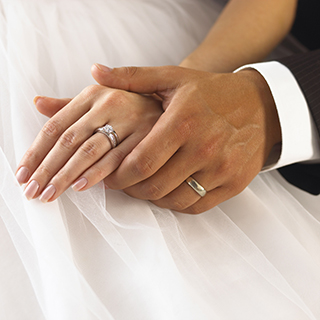The Sheva Brachot: Whom to Give Which Blessing
Permanent link All Posts
I have been married, I have been to Jewish weddings, and I have been in Jewish weddings that were not mine. And it’s just hard watching someone who is not familiar with Hebrew struggle and stumble through the thicket of words that are the Sheva Brachot— especially knowing that, had they been given another blessing, they would have come across very nicely.
So this is not about the meaning— literal or spiritual— of the seven blessings said under the chuppah. This is simply a guide to help soon-to-marry couples decide whom to give which blessing to recite in front of dozens, or hundreds, of people. In short: once you have chosen the seven people you wish to read the blessings, how do you decide which person gets which one? (Of course, this only applies if you are, in fact, having them read in Hebrew):
Blessing #1:
This is the blessing over wine, the “boray pree hagafen” that is one of the most well-known of all Hebrew blessings, right up there with “Hamotzi.” It’s the lead-off one, so your impulse might be to give it to someone with an imposing resume. But to them, it might be the equivalent of asking A-Rod to play whiffle ball. Better to give this first one to someone with a basic, general knowledge of Jewish life; there are toughies later that you’ll want to save your heavy hitters for.
Blessing #2:
This one starts like 90% of blessings— “baruch atah…” but ends in three unfamiliar words. And there’s a “chh” in one of the words, too. So you’ll want someone who can learn three new Hebrew words, given enough prep time.
Blessing #3:
The same “baruch atah” start again, but now only two new words. But they are short and easy, with no “chh” sounds. And just two new words! So again, someone who can manage that.
Blessing #4:
This one is the second-longest. It does have the “baruch…” intro, but then it goes on for a while. So you’ll want to give this to someone with a very good knowledge of Hebrew. Maybe a Hebrew teacher of yours, a friend with a degree in Jewish Studies, someone who spent a year in Israel…
Blessings #5 and 6:
These have the “baruch…” part, but not until the end. They require a better-than-average Hebrew reader. Try someone who you know can lead services or read from the Torah.
Blessing #7:
This final one is the longest by far. It also has two passages that have become songs, so the guests might want to sing those passages along with the reader. For this one, it’s best to have someone with a very good knowledge of Jewish traditions and melodies… as well as someone with a decent voice! So you might want to give this one to a friend or relative with cantorial training… or just to the cantor, who would take it as an honor.
Now, if you don’t have enough proficient Hebrew readers in your circle, you still have options. The Sheva Berachot are often done in a sing-song style, so you could probably get a cantor to do them one by one, alternating in the English translations read by your family and friends. Or you could just have the cantor run through all seven, then have your honorees come up and repeat them all, each in turn.
Any way you do this, you will want to let the honorees know at least a couple of weeks that they will be getting up and reading something in public. Most people want to rehearse, so you should provide them with the blessings list, with theirs highlighted. Yes, the whole list, so they know their place in the batting order. Or, if you don’t want them opening up a whole piece of paper under the chuppah, you can give them theirs on a numbered 3x5 card. In either case, you can include transliterations, too.
If you think it’s necessary, you could let the Best Man or Maid of Honor have a master list of who goes when, and have him or her call people up. I’ve even seen it done with intros: “Reading the second blessing, the Uncle of the Bride.” This both tells the guests who this guy is… and signals Uncle Ned to get his tuxedo up there.
I have just seen way too many ceremonies glide along with grace only to come to a jarring halt when it’s time for the Sheva Brachot. You get people forgetting it is their turn, so there is an awkward nothingness until they get to the microphone. People sweating over tongue twisters written in the “wrong” direction. People having to have someone guide them through it, one excruciating syllable at a time, while the guests cringe in empathy and impatience.
All of this can be completely avoided by knowing which blessings are easy to say and which are decidedly less so, and then matching the reader with the blessing appropriately.
One last point: the same Seven Blessings are read again, as a conclusion to the Grace After Meals. If people are put out by not being included in the initial Seven Blessings read during the ceremony under the chuppah, just know you have seven more opportunities to have them bless you on your blessed day.



.jpg)



